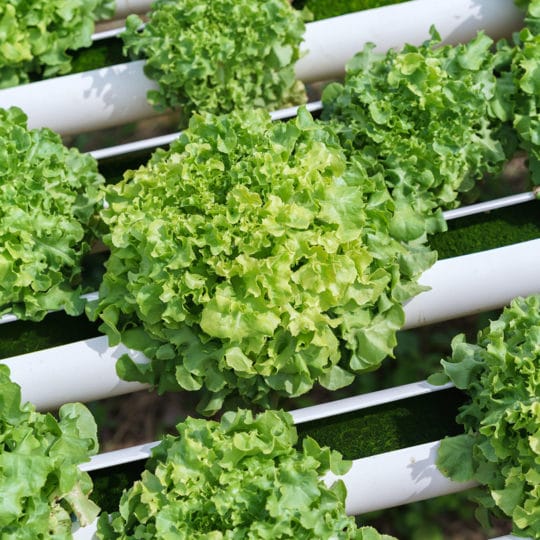How Perlite Is Used for Hydroponic Gardens
Vegetables Grow Best with Perlite

During the wintertime, the most avid horticulturists and home gardeners turn to greenhouses to grow their plants and crops. There are a couple of ways they can ensure their plants have the best chance of growing. One method is hydroponics: a method of growing without soil by using water fortified by mineral nutrient solutions. Perlite is a popular choice for hydroponic gardens.
What Is Horticultural Perlite?
To see why perlite is important for hydroponic gardens, it’s helpful to take a look at the benefits of horticultural perlite. This mineral is a lightweight, inorganic (chemically speaking), soil substrate that provides a number of important benefits, including:
- Inorganic: Perlite is stable and doesn’t decompose or break down. It also doesn’t transfer disease.
- Gas Exchange: The grape-like pore structure within the perlite particles will readily exchange the entrapped air directly to the soil, completing the transfer of oxygen to the soil and having made oxygen available for uptake by the plant’s root system.
- Neutral pH: Perlite’s pH range is 6.5 to 7.5—the ideal zone for most plants to absorb nutrients.
- Light Weight: Perlite is lighter than grit or sharp sand, pumice, or other aggregates—which can also be used to improve drainage in a garden bed. It is easier to handle products for manufacturers and makes it easier for home gardeners to work with.
- Rich in Essential Elements: Perlite supplies iron, sodium, calcium, and other trace elements to help your plants thrive.
The Benefits of Perlite for Hydroponic Gardens
Horticultural perlite is particularly beneficial for hydroponic gardens. In hydroponic systems, roots are grown in troughs of perlite which are supplied with a fertilizer/nutrient solution. This allows the right amount of water and oxygen to get to the roots. According to research, plants grown hydroponically with perlite produce a heavier crop for the space, providing a better quality product. In addition to the benefit of increasing crop, perlite does not attract pests or diseases, and it can easily be replaced. Its pH provides the ideal zone for most plants to absorb nutrients that can be added to the water mixture.
Common plants grown hydroponically with perlite include:
- Tomatoes are less prone to splitting when grown hydroponically with perlite than if they were grown in soil.
- Lettuce grown hydroponically with perlite often results in larger and better-shaped heads and nearly always in a lower incidence of tipburn.
- Strawberries require a large amount of oxygen in the root zone, and perlite’s high porosity helps maintain that ideal environment.
Join Our Mailing List
Our blog offers insight and information about new and exciting uses for perlite, diatomaceous earth, and vermiculite deriving from years of research and application. From passive fire resistance to mineral depth filtration, by subscribing to our mailing list, you will receive the latest information surrounding the Dicalite, Dicaperl, and Specialty Vermiculite brands and products.